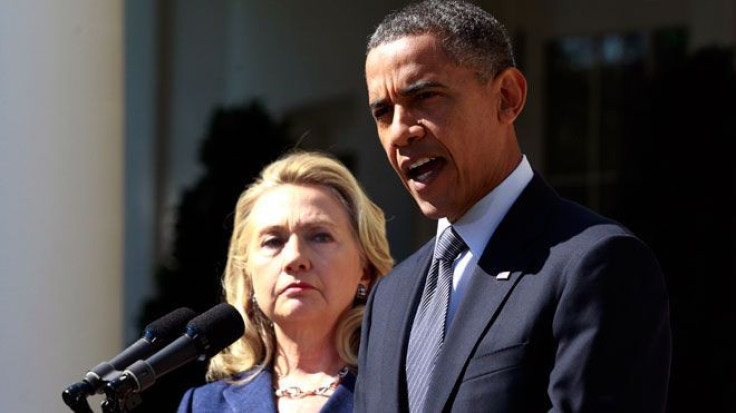Obama's Organizing For Action Could Lead To Government Corruption, Watchdogs Fear

President Barack Obama’s record on transparency has taken a hit as government watchdog groups -- the same that initially backed him -- question the creation of a new dark money group spearheaded by former high-level Obama staffers.
Obama may have run the last political campaign of his career, but his 2012 campaign staff wasn’t about to let the massive amounts of voter data and grassroots support it amassed during election season go to waste. The result? Organizing for Action, or OFA, an advocacy group that organizers say will be devoted to advancing the president’s second-term agenda and promoting the kind of grassroots organization that catapulted Obama to the presidency in 2008.
"It will be a supporter-driven organization, as we've always been, staying true to our core principles: 'respect, empower, include,’” Jim Messina, Obama’s 2012 campaign manager and the chair of Organizing for Action, explained in a January email.
But Organizing for Action isn’t just any kind of group. Formed under section 501 (c)(4) of the tax code, it is technically classified as a social welfare nonprofit. That designation, in addition to making those groups completely tax exempt, allows them to lobby and advocate for issues and political candidates, without revealing the names of their funders.
OFA joins the ranks of other dark money groups (like Karl Rove’s Crossroads GPS) that expended at least $213 million to influence the 2012 election, according to an analysis by the Sunlight Foundation. Because they are not required to disclose their donors, there is no way to know who exactly funded those groups, a majority of which reportedly devoted their resources to electing Republican candidates.
Strategy-wise, it makes sense to classify OFC as a dark money group since, as a nonprofit, organizers can meet and coordinate with members of the Obama White House (which couldn’t be done, by law, if the group was a super PAC). But the decision to accept unlimited, undisclosed sums from individuals and corporations is disturbing to the government transparency groups that once backed Obama.
Both Common Cause and Public Citizen fear the creation of OFC could give unknown corporations and wealthy donors too big of a say in Obama’s agenda, an occurrence that “creates a huge potential for government corruption.”
Although OFC will not accept money from lobbyists or political action committees, Nonprofit Quarterly notes that it is hardly necessary for the group to solicit those donations when they can receive unlimited funds directly from corporations.
Conservatives who were mercilessly attacked by Democrats, who have traditionally framed themselves as the defenders of campaign finance transparency, have been quick to accuse the Obama administration of hypocrisy.
The fuss could potentially be for nothing. In January, Messina told the New York Times that OFC would, in fact, disclose its financial sources. But he did not specify when that will occur or if it would also include donation amounts.
Still, Obama has a history of shifting his views when it comes to money in politics:
2007: Then-Senator Obama pledged to take part of the presidential financing system for the general election, under which a candidate receives taxpayer money toward their campaign but cannot spend beyond the amount of that government grant.
But in June 2008, Obama announced he was opting out of the system, becoming the first general election candidate to decline public financing since the program’s creation. He went on to outspend his rival John McCain, R-Ariz., who did accept public financing, by about four-to-one.
2008: After his historic victory, Obama’s inaugural committee pledged it would not accept corporate donations or individual contributions exceeding $50,000 to finance the event. At the time, his staff said it was abiding by “an unprecedented set of limitations on fundraising as part of President-elect Obama’s pledge to put the country on a new path.”
However, for his second inauguration, which reporters noted was considerably scaled back compared to the festivities four years earlier, Obama’s team reversed the policy, opening the door to corporate donors and unlimited contributions.
2010: After the U.S. Supreme Court issued its Citizen United decision, leading the way to the creation of super PACs, Obama publicly opposed the ruling and pledged to not use super PACs as a fundraising tool.
“Last week, the Supreme Court reversed a century of law that I believe will open the floodgates for special interests, including foreign corporations, to spend without limit in our elections,” Obama said in his State of the Union address a few days after the decision. “I don’t think American elections should be bankrolled by America’s most powerful interests or, worse, by foreign entities.”
Only seven months later, the Obama campaign, citing the need to “face the reality of the law as it currently stands,” reversed that stance. Priorities USA, a pro-Obama super PAC founded by former White House aides, ultimately spent more than $60 million to help reelect the president in 2012.
© Copyright IBTimes 2024. All rights reserved.











